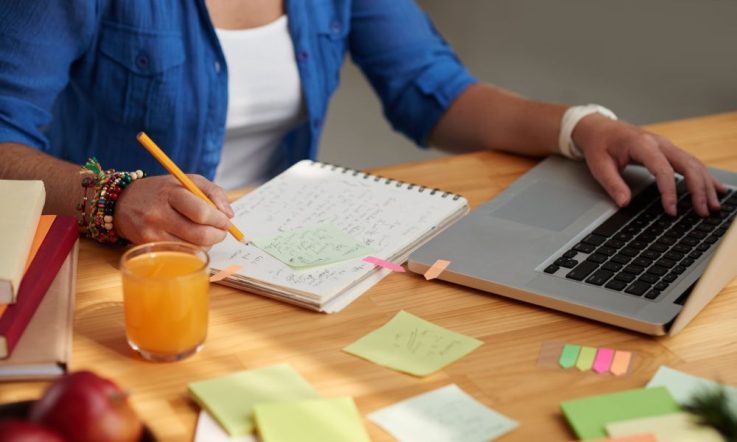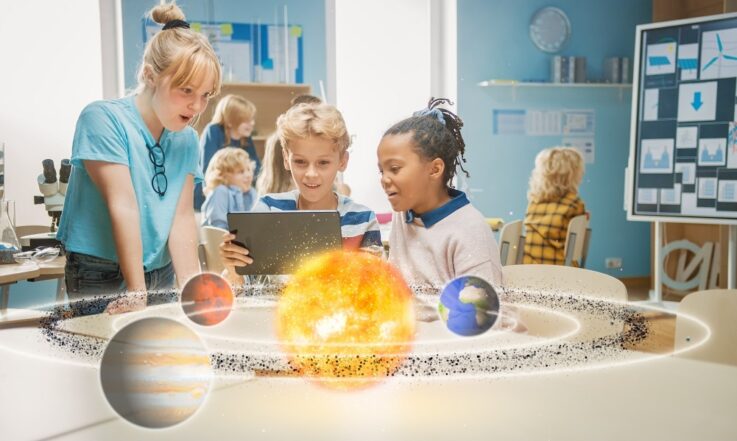This podcast from Teacher is supported by MacKillop Seasons, whose Seasons for Life project supports schools with loss and grief following a suicide and other loss event.
Thanks for listening to this episode of Teacher Staffroom, where we catch you up on the latest evidence, insight, and action. I'm Rebecca Vukovic.
How many scientists are mentioned in high school science curricula here in Australia? How many of those do you think are women? These 2 questions kicked off a brilliant podcast we published this month that explored the way that female scientists were overlooked in high school science. We also published an article that explores how one school is improving student outcomes by celebrating female figures in STEM, and share how 2 female science educators were named the latest winners of the Prime Minister’s Prizes for Science. There’s a lot to cover in today’s episode, so let’s jump straight in.
Okay so the first piece I’d like to highlight is a Research Files podcast we published with astrophysicist Dr Kathryn Ross. Discovering that Marie Curie wasn’t even mentioned in the radioactivity section of one state Physics syllabus, Kat set out to explore if the contributions of other women were being overlooked. As Teacher editor Jo Earp says in this episode, the fact that the research team found a gender bias probably won’t surprise you, but the extent of it will. Kat and her team found that across all of the states and territories in Australia there are 145 unique scientists that are mentioned; and of those 145 scientists, just one is a woman, and that's Rosalind Franklin. And she's only mentioned in Queensland and the combined South Australia/Northern Territory syllabuses. So, there's only one woman in all of Australia, and she's not included in the majority of states and territories in Australia. Throughout the episode, Jo and Kat discuss the findings, which are published in the Australian Journal of Education, and the wider implications that they have on students studying these courses.
Here’s a quote from Kat from the episode – she’s discussing how the team weren’t necessarily shocked by the findings themselves, but rather the extent of them.
‘… just the extent to which it is so clearly biased, I think was what was shocking. In particular, the fact that Marie Curie isn't mentioned, despite the fact that every single state covers radioactivity, and she even coined the term ‘radioactive’. But she's not mentioned once anywhere in Australia. I think stats like that is what's really shocking to me, that it doesn't matter how remarkable the women are or how remarkable the work is, it's still underappreciated, it’s still under celebrated and it's not being taught to the same extent that men are being taught. So, I think the stats themselves weren't necessarily shocking, but the extent to which it's happening and also the way that most people just didn't seem to even realise this was a problem, I think that's what's really shocking. That it's just a pervasive, unconscious bias that we have of science as done by men, science as only ever been done by men, and women have played no role and continue to have no role in science – and that is just fundamentally incorrect. So, we're teaching this inaccurate view of science. I think the view that a lot of people that are either teachers or the curriculum developers, the students, everyone involved in science education, that there was such a pervasive narrative that this was true, and that people were not really aware of this gender bias, I think that was what was more shocking to us as researchers.’
After listening to the podcast, here are some questions for you to consider, either by yourself or with a team of colleagues.
On your own, or with colleagues, take a look at the course content in your area of science. Have a listen to the starting suggestions of female scientists shared by Dr Kat Ross in this podcast. How could you include these in your own lesson planning?
Off the back of this podcast, there is another article I wanted to share with you. Queensland primary school STEM teacher Megan Hayes has been recognised for her work that’s seen girls’ participation in STEM increase in her school. The Mudgeeraba Creek State School teacher was named winner of the 2021 Prime Minister’s Prize for Excellence in Science Teaching and she joined Teacher for an episode in our School Improvement podcast series in 2022 to discuss the successful initiatives she’s implemented at her school to improve STEM participation and outcomes for female students.
Reflecting on why she is passionate about girls’ participation in STEM, Megan tells Teacher that the first thing that was evident to her when she began teaching in the STEM field was the waning enthusiasm in girls as they moved through the primary years.
‘That was a personal observation,’ she shares. ‘I noticed that in the early years the girls were really enthusiastic and as fearless as the boys, but by the time they reached the upper years there was a real change in their attitude about the way they engaged with lessons and topics and discussion.’
In the article, Megan shares how her connections with feeder high schools and local universities have been paramount to her ability to expose students to female figures in STEM, and tells readers how she has had success in using more age-appropriate pedagogy, such as storybooks that focus on a female in a STEM role or a female as the character that finds a solution to the problem.
After reading the article, consider these questions:
Reflecting on this school year, think about the role models you included in your lesson plans to share with students. Were these role models authentic and relatable? Was there a gender imbalance in the role models you presented?
Still on the topic of women in STEM, the latest winners of the Prime Minister’s Prizes for Science were announced this month. This year, the winners of the 2 teaching prizes were Judith Stutchbury from Queensland and Donna Buckley from Western Australia who each take home $50,000 in prize money. In the article published on Teacher, Dominique Russell takes a look at the work they’ve been doing in their school settings that has had them recognised at a national level.
We also published part one of a 2-part series written by Kristie Schulz, Head of Curriculum (Secondary) at Parklands Christian College. In 2018, Kristie wrote 3 articles for Teacher sharing how the Queensland school had successfully introduced a new STEM Studies elective for its year 10 students. The series explained how the journey began, the course design and implementation process, and approach to student assessment. Five years on, in 2 updates, she shares details of research findings looking at the pedagogical framework used and how the program has since been implemented in 3 Prep classes.
And finally, we also published an infographic that explored girls’ interest in engineering, drawing on data from the 2021 Youth in STEM study. The study surveyed 3,154 young people aged between 12 and 25 years about their awareness and perception of STEM subjects and careers. You’ll find this infographic and all the pieces I’ve mentioned, in the episode transcript over at our website, teachermagazine.com
Coming up, I’ll be sharing some other highlights from a busy month here at Teacher. But first, here’s a quick message from our sponsor.
You’re listening to a podcast from Teacher magazine, supported by MacKillop Seasons, whose Seasons for Life project supports young people affected by suicide and other loss events throughout Australia. Free for Australian high schools and based on the strong evidence-base of the Seasons for Growth change, loss and grief education programs, the Seasons for Life project builds wellbeing, resilience, social and emotional coping skills, and strengthens supportive relationships.
This month, we launched our annual Teacher Reader Survey. It is an opportunity for you to let us know the content formats you like consuming most – for instance, whether you prefer shorter or longer articles, if you enjoy our podcasts, videos and infographics. You also have the opportunity to share the topics that are most important to you – for instance, perhaps you’re wanting to read more about leadership, mathematics, or student wellbeing. As well as this, we ask you to share an example of how you’ve used our content to support your professional practice. The responses from this survey help to shape our content for the next 12 months, so we’re really excited to hear what you have to say. Perhaps best of all, if you live in Australia and complete our survey, you can go into the running to win a $500 gift card.
You would have seen by now that we have been sharing the stories of each of the winners of the Teacher Awards this year. I wanted to highlight the pieces that were published this month, and encourage you to check out the full articles to learn more about the incredible work they’re doing to lift student outcomes and improve the lives of students.
We spoke with Melanie O’Leary and Marcia Burgess from Catholic Education South Australia who were named winners, alongside the other team members, of the Excellence in Curriculum Design and Implementation Award, sponsored by Grok Academy.
We also sat down with the winner of the Fostering Strong School-Community Partnerships Award, Rubina Shaheen Nawabi from Noble Park English Language School in Victoria to talk about how she has spent her entire 30-year career working with newly arrived, refugee and migrant families from Culturally and Linguistically Diverse backgrounds.
We also caught up with the winner of the Improving Student Learning and Progress Award Catherine Young from Newman College in Western Australia to chat about how she uses data to monitor student progress and evaluate the effectiveness of teaching.
In another article, the winners of the Excellence in Staff Collaboration category, Bernadette Hawker and Brett Hallett from Goondiwindi State High School in Queensland shared with readers how staff work collaboratively across faculty areas to improve student writing outcomes in all year levels and subject areas.
And finally, we spoke with Melissa Shepherd from Laura State School in Queensland about what it meant to her to be named the winner of the Leadership Award for Driving School Improvement. It has been a pleasure to bring you these articles and to share the incredible work of these educators.
Now, before I let you go, the final piece I wanted to share with you is Episode 3 of our School Assembly podcast series which focuses on recruitment in a time of teacher shortages. In the episode, principal Jo Camozzato from Bemin Secondary College speaks candidly about the challenges involved in building her team of teachers, leaders and support staff in time for the school to open its doors to students in 2024.
I’ll leave you with this quote from Jo where she’s discussing some of the key challenges she’s up against when it comes to attracting people to the vacant roles she has at the school.
There are different things that you're up against. So, depending on the system and the state, there are incentives to stay, there's bonuses to come across to another school – but of course most of us are trying to work within what's fair and equitable for the current staff that we've employed or staff that we've got on our books. But I also think, Jo, that you know, teaching’s no longer, I think perceived necessarily by people or the public as an attractive profession to go into. It used to be ‘Oh, you know, you get school holidays …’ Well, you know, let's be honest. I mean, this is when teachers and principal teams and education staff want to go away and this is when we're slugged with the highest airplane tickets, the highest costs of Airbnb's. So, we'd really rather travel other times of the year. So, school holidays don't have that attraction. And we also know that there are other vocations out there with competitive salaries. Some places allow you to work from home; and even though I know employers want to get people back, the reality is that that space has changed, and people are able to work from home in many things – small startups, big businesses. And some schools, maybe that's possible, but most parents want their kids to go to a place, to go to school, because they've gone to work themselves, and they don't want younger children staying at home. It's easy to say that, but it's not necessarily easy to achieve.
Here are some questions to consider:
As a leader who’s hiring: How would you sell your school to prospective job applicants? What are 3 things you look for in a potential recruit?
As a teacher or leader applying for a new role: How much ‘homework’ do you do on a school before writing an application or attending an interview?
That's all for this episode. You’re now all caught up on the latest evidence, insight and action. Links to all the content and the resources I’ve mentioned will be in the transcript of this podcast available over at our website, teachermagazine.com.
Subscribe to our podcast channel wherever you get your podcasts from, so you can be notified of any new episodes as soon as they land. And, while you’re there, we’d love if you could rate and review us.
You’ve been listening to a podcast from Teacher, supported by MacKillop Seasons, Seasons for Life, supporting schools and young people affected by suicide and other significant losses. Visit mackillopseasons.org.au



